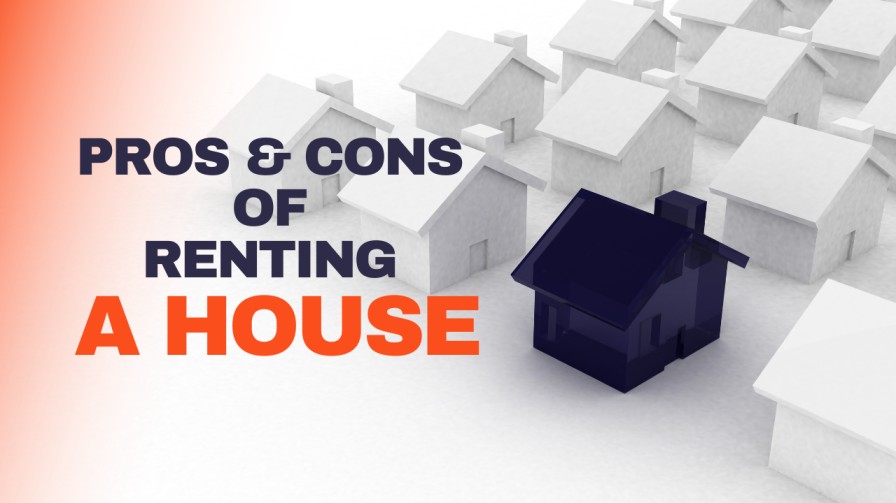Renting out a house has the potential to be a moneymaking opportunity, offering a regular income and possible financial gains in the long run. However, like any investment, there are both advantages and disadvantages to consider. In this comprehensive guide, we’ll delve into the pros and cons of renting out a house, providing insights into important aspects that every property owner should carefully think about.
Pros of Renting Out a House:
1. Steady Income:
Renting out your house provides a reliable and steady income stream. This income can be particularly advantageous for covering mortgage payments, property taxes, and other associated costs. The regularity of rental payments can offer financial stability and contribute to your overall financial goals.
2. Property Appreciation:
Real estate has a historical trend of appreciating over time. By renting out your house, you not only benefit from monthly rental income but also stand to gain from the potential appreciation of the property’s value. This appreciation can result from factors such as improvements in the neighborhood, overall market trends, or specific upgrades made to the property.
3. Tax Advantages:
Landlords often enjoy various tax advantages. Mortgage interest, property taxes, and operating expenses are typically deductible. Additionally, depreciation of the property can be used to offset rental income. Consultation with a tax professional is recommended to maximize these benefits and ensure compliance with relevant tax laws.
4. Equity Building:
Tenant rental payments contribute to building equity in your property. As your mortgage balance decreases over time, your equity in the property increases. This equity can serve as a valuable asset and may be leveraged for future investments or financial needs.
5. Asset Diversification:
Renting out a house allows you to diversify your investment portfolio. Diversification helps spread risk and can provide a hedge against economic downturns in other sectors. Real estate investments often have a low correlation with stocks and bonds, making them a valuable component of a well-rounded investment strategy.
Cons of Renting Out a House:
1. Tenant Issues:
Dealing with difficult tenants can be a significant challenge. Issues such as late payments, property damage, or breaches of the lease agreement can require time and effort to resolve. A thorough tenant screening process can help mitigate these risks, but challenges may still arise during the course of a lease.
2. Market Volatility:
Real estate markets can be unpredictable. Economic downturns or fluctuations in local housing demand can affect property values and rental prices. Landlords should be prepared for potential market volatility and have a strategy in place to weather economic uncertainties.
3. Property Maintenance:
Property maintenance is a critical aspect of being a landlord. Regular upkeep and addressing repairs promptly are essential to maintaining the property’s value and ensuring tenant satisfaction. Budgeting for routine maintenance can help prevent larger, costlier issues down the line.
4. Regulatory Challenges:
Navigating landlord-tenant laws and regulations can be complex. Each jurisdiction has its own set of rules governing the landlord-tenant relationship. Non-compliance can lead to legal issues, emphasizing the importance of staying informed about local laws and seeking professional advice if needed.
5. Vacancy Risks:
Extended periods without tenants can pose financial challenges for landlords. During vacancies, landlords still have to cover mortgage payments and other expenses without rental income. Effective marketing, setting competitive rental prices, and maintaining a property in good condition can help minimize the risk of prolonged vacancies.
Conclusion:
Renting out a house can be a rewarding venture, but success requires careful consideration of the pros and cons. By understanding the potential benefits and challenges, landlords can make informed decisions to maximize their investment. Whether you’re a seasoned property owner or a first-time landlord, navigating the rental market with awareness and preparation is key to a successful and profitable experience.
FAQs About Renting Out a House:
Q1: Is renting out a house a good investment?
A1: Renting out a house can be a lucrative investment, providing a steady income and potential long-term appreciation. However, it comes with risks and responsibilities that should be carefully considered.
Q2: How do I find reliable tenants?
A2: Thoroughly screen potential tenants, checking references, credit history, and rental background. Consider working with a property management company to ensure a rigorous tenant selection process.
Q3: What are the tax implications of renting out a house?
A3: Rental income is taxable, but landlords can benefit from tax deductions on mortgage interest, property taxes, and operating expenses. Consult with a tax professional to understand specific implications in your situation.
Q4: How can I minimize property maintenance costs?
A4: Regular maintenance and prompt repairs can prevent larger, costlier issues. Consider budgeting for routine inspections and addressing any concerns promptly.
Q5: What should I do in case of tenant disputes?
A5: Clearly outline expectations in the lease agreement and address disputes professionally. If conflicts persist, familiarize yourself with local laws and consider seeking legal advice.






